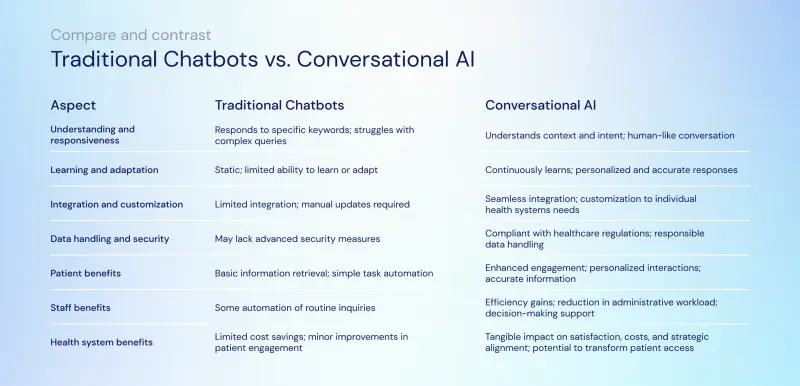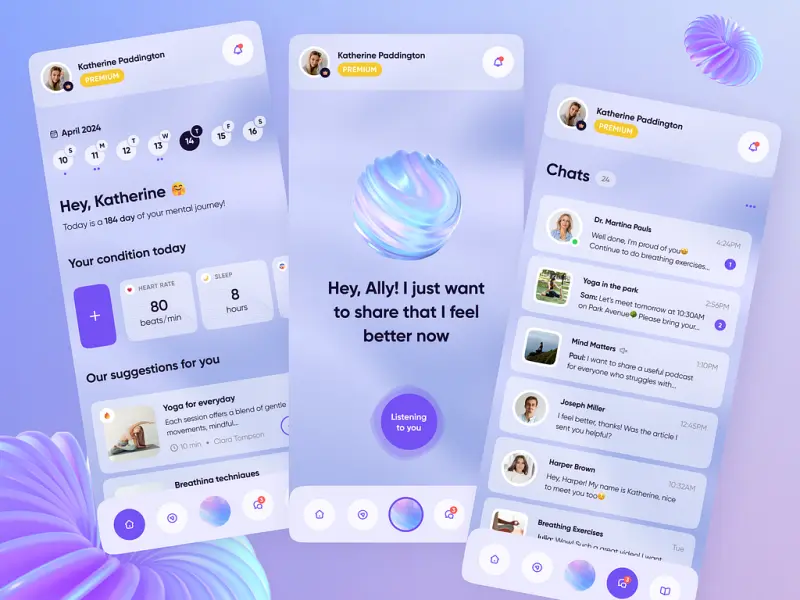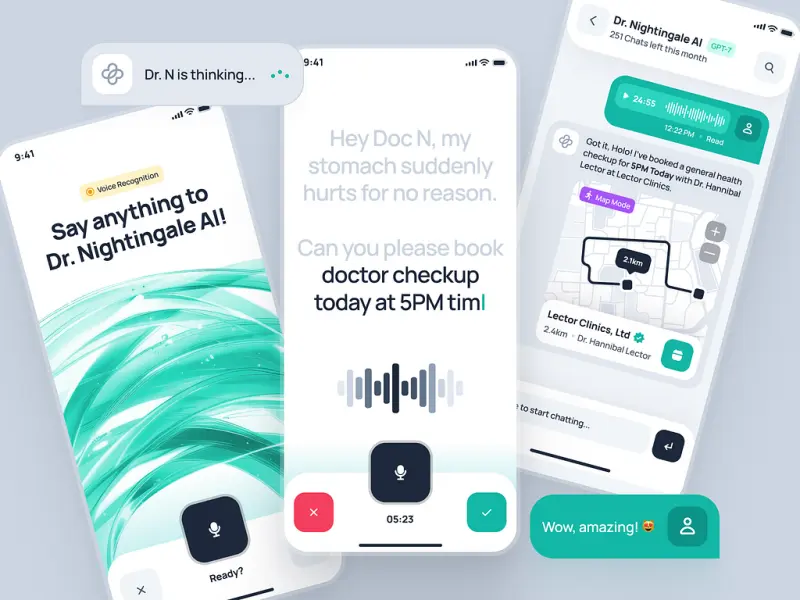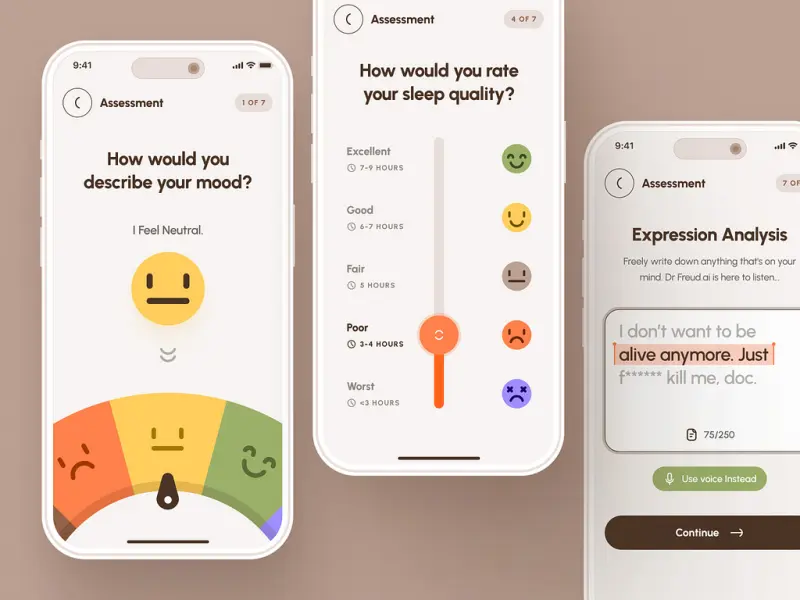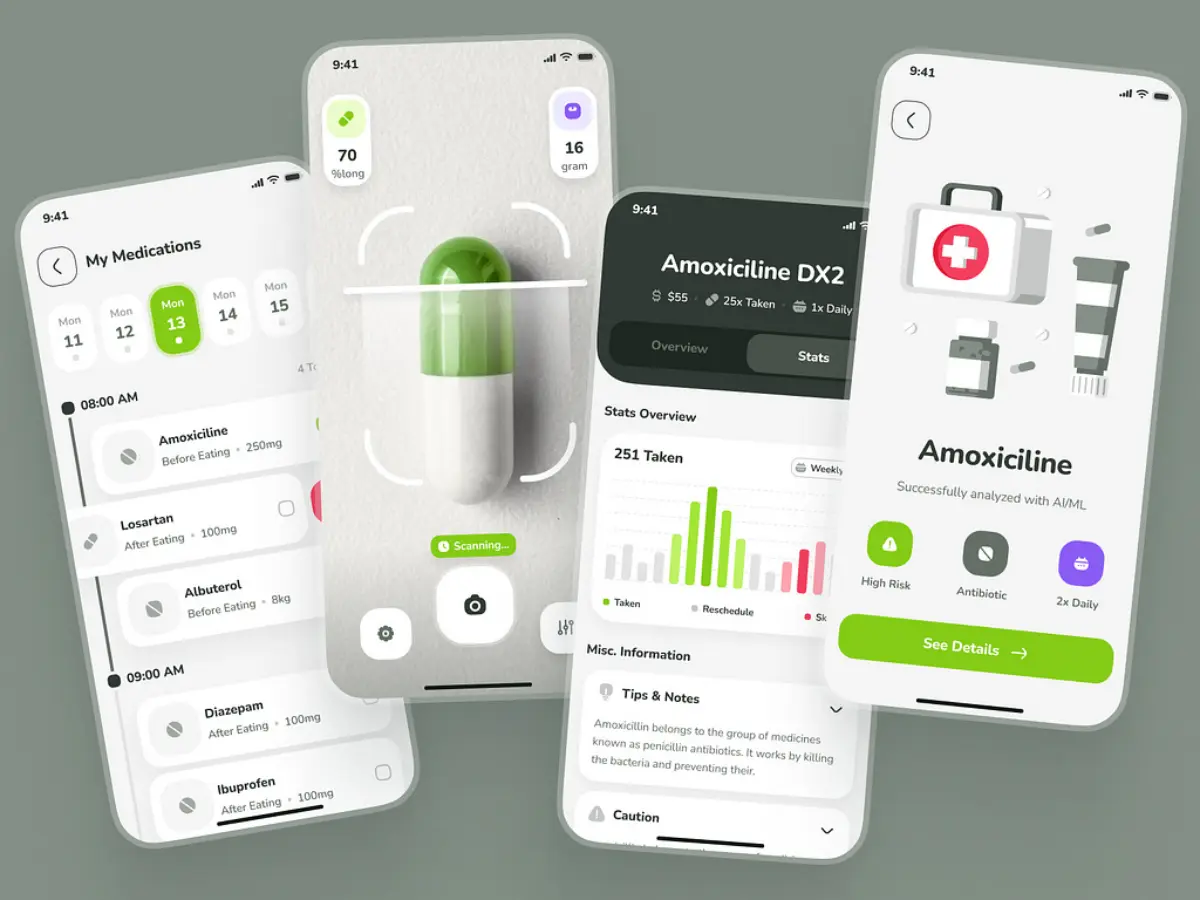Conversational AI in Healthcare – Everything You Need to Know
- TECHVIFY Team
- 0 Comments
In an era where technology is changing almost every industry, conversational AI in healthcare has become a promising way to solve long-standing problems. However, despite large financial investments and long implementation times, many chatbots still fail to meet expectations. This often leads to unhappy patients, more work for already busy patient engagement teams, and extra stress on contact centers.
Most of the time, patients trying to schedule appointments through a chatbot are redirected to a call center or mobile app. Research shows that patients do not want to use the phone for these simple tasks. Ironically, many chatbots were created specifically to reduce the number of calls to contact centers. Even worse, 82% of healthcare consumers say they would switch providers after a bad experience.
Unlike basic chatbots, conversational AI in healthcare leverages advanced NLP, machine learning, and artificial intelligence to create natural, human-like conversations. This technology is set to transform healthcare by streamlining workflows, enhancing access, and boosting patient engagement.
In this article, we’ll look at how conversational AI, driven by Natural Language Processing (NLP), is changing healthcare and solving these problems.
I. What Is Conversational AI in Healthcare?
Conversational AI is a game-changing technology that can greatly improve healthcare. But before diving into how it’s used, it’s important to first understand what conversational AI actually is.
Simply put, conversational AI helps computers talk with people in a natural, human-like way. It uses advanced tools like AI, machine learning, and NLP to comprehend and respond to spoken or written words. This is much more advanced than basic chatbots, which only follow set scripts.
Conversational AI stands out because of its ability to respond intelligently to all sorts of conversations. It can keep track of the context, ask follow-up questions, and manage more complicated interactions. Over time, it gets better at this through machine learning.
Conversational AI vs Traditional AI
Healthcare organizations that use conversational AI are already seeing improvements in how they work. It helps cut costs, improve patient access, increase staff efficiency, and boost patient satisfaction. By taking over simple tasks, it frees up staff to focus on more important work.
Conversational AI is transforming the way we engage with technology. It will soon become a key part of delivering modern healthcare as it becomes more common. With that in mind, let’s explore some of the main ways conversational AI is used in healthcare.
Still want to see more Healthcare articles? Check here:
II. Beyond Chatbots: Key Benefits of Conversational AI in Healthcare
What exactly does conversational AI offer to healthcare? The answer lies in its ability to enhance various aspects of healthcare delivery. Let’s explore some of the main benefits this technology brings.
Enhancing Patient Experience
A major benefit of conversational AI in healthcare is its ability to improve patient engagement and experience. In today’s healthcare environment, patient-centered communication is more than just a buzzword—it’s been shown to contribute to better health outcomes and foster stronger relationships between patients and providers. By using conversational AI, healthcare organizations can make patient interactions more interactive and engaging, ultimately enhancing patient satisfaction and raising the standard of care.
Increasing Patient Engagement
Conversational AI stands out for its ability to provide instant responses and personalized interactions, which helps boost patient engagement. When patients are actively engaged in their healthcare experience, their participation often leads to better engagement, more consistent interactions, and higher satisfaction levels.
Streamlining Practice Efficiency
Another significant benefit of conversational AI is its ability to streamline workflows. With the help of automation, tasks like scheduling appointments, answering common questions, and managing patient records can be handled more efficiently. This enables healthcare professionals to concentrate on more critical tasks that require their expertise.
Reducing Costs
Conversational AI can also bring substantial cost savings. Studies have shown that many unnecessary healthcare expenses in the U.S. come from inefficient administrative processes. By automating repetitive tasks, conversational AI helps reduce these operational costs, enabling healthcare providers to concentrate on delivering high-quality care.
Automating Routine Tasks
Healthcare organizations can automate a large portion of patient communication by deploying chatbots and other conversational AI platforms. This reduces wait times and frees up resources to handle more complex patient issues. With the ability to understand patient queries, provide relevant information, and guide individuals toward solutions, conversational AI has become a crucial tool for automating responsibilities while boosting the overall efficiency of healthcare operations.
Looking to Outsource Development?
Contact TECHVIFY – Vietnam’s Leading Offshore Software Development & Outsourcing Company, for consultation and development services.
III. Use Cases of Conversational AI in Healthcare
Conversational AI is increasingly being integrated into healthcare, offering innovative solutions that range from drug discovery to disease diagnosis and improving patient care. In hospitals, AI-driven chatbots are automating routine tasks like monitoring vitals and distributing medication, allowing healthcare professionals to focus on more critical responsibilities. Below are some of the most impactful use cases for conversational AI in healthcare:
1. Appointment Scheduling
In today’s healthcare environment, efficient administrative processes are crucial. Conversational AI can automate the often time-consuming task of managing appointments. By using rule-based programming, conversational AI platforms can schedule, reschedule, or cancel appointments with minimal manual input, reducing the chances of human error.
Additionally, these systems can ensure that patient data is always up to date by prompting users to update missing or outdated information. This creates a more organized healthcare system and a smoother experience for patients.
2. Patient Care Management
As healthcare becomes more patient-centric, conversational AI plays an essential role in enabling communication between healthcare providers and patients. It allows patients to easily request prescription refills, access test results, and receive medication details. This technology empowers patients by giving them control over their healthcare journey, making interactions more engaging and human-like.
Conversational AI in healthcare
3. Patient Support
Ensuring that patients can easily navigate the healthcare system is a key focus of modern healthcare. Conversational AI can simplify tasks like creating MyChart accounts or resetting passwords—small but essential functions that can be barriers for some patients. By streamlining these processes, conversational AI promotes ease of access and fosters trust in the system.
4. Proactive Patient Reminders
In healthcare, timely reminders can make a significant difference. Whether it’s for appointments, vaccinations, or prescription refills, conversational AI in healthcare can send personalized notifications to patients, ensuring they stay on top of their healthcare needs. This not only improves health outcomes but also reinforces the sense that healthcare providers are attentive and invested in patient well-being.
5. Invoice Payment and Claims Management
Financial processes in healthcare—such as billing, insurance claims, and payments—can be overwhelming for patients. Conversational AI can manage these tasks, providing clarity and speeding up processes. From generating itemized invoices to resolving claims, AI integrates with existing healthcare systems to streamline financial interactions, reducing patient stress.
6. Seamless Bot-to-Agent Hand-off
While AI is powerful, the human element remains essential, especially in sensitive healthcare situations. Conversational AI can detect when a patient’s issue is too complex or when emotional support is needed. In these cases, the system facilitates a smooth hand-off to a human agent, ensuring the patient doesn’t need to repeat their information and maintaining a high level of care.
IV. Considerations for Building a Conversational AI Strategy for Healthcare Organizations
Implementing conversational AI in healthcare requires a tailored approach, given the unique needs and challenges of the industry. Healthcare organizations must carefully assess platforms before investing in this technology, as AI deployment comes with risks. Below are key considerations to keep in mind when developing a conversational AI strategy for healthcare.
Start by Automating Painful Tasks
Ease the adoption of conversational AI by automating tasks that are particularly time-consuming or repetitive. By focusing on areas where staff are overwhelmed, like booking appointments or responding to common queries, AI can quickly prove its value. It’s essential to make sure AI fits seamlessly into existing workflows to minimize resistance, especially from staff who are already burnt out. The goal should be to reduce workload without adding complexity.
Prioritize Security and Compliance
In healthcare, security and compliance are non-negotiable. When selecting an AI vendor, ensure they are HIPAA-compliant and follow strict protocols for protecting patient data. This includes having robust practices for handling protected health information (PHI), such as encryption and access controls. Security breaches or improper handling of sensitive data can result in severe legal consequences and loss of trust, so security must be a top priority throughout the AI implementation process.
Conversational AI for healthcare
Start Small and Scale Gradually
It’s wise to begin with a few simple use cases rather than rolling out a full-scale solution immediately. Focus on automating straightforward tasks first, such as appointment reminders or basic patient inquiries. Once you’ve proven the return on investment (ROI) with these initial use cases, you can gradually expand to more complex applications, like symptom checking or patient triage. This approach helps mitigate risks and ensures that the technology is scalable in a real-world healthcare environment.
Continuously Optimize
Healthcare conversational AI systems require constant improvement. Collect feedback regularly from both patients and staff to understand how well the system is working. Monitor key metrics like accuracy, usage rates, and overall satisfaction to identify areas for enhancement. Keep in mind that the healthcare sector has its own specialized language, and conversational AI must understand this context to function effectively. Vendors relying on generic pre-trained models may not have the depth required to handle healthcare-specific terminology and scenarios. Continuous optimization is key to improving performance over time.
Access to Quality Training Data
Conversational AI systems are only as good as the data they are trained on. For healthcare organizations, it’s crucial to work with vendors that provide high-quality, industry-specific data to train AI models. This ensures that the AI can understand and respond to complex medical terminology, patient queries, and industry-specific scenarios. Additionally, testing the AI platform with your own data during a demo is critical. This allows you to see how the system will actually perform in your unique environment and reveals its true capabilities beyond what marketing materials might suggest.
Test Real-World Performance
Before committing to any conversational AI platform, request a demo that uses your actual data and involves real users. This will give you a better understanding of how the system performs in real-world scenarios, beyond hypothetical use cases. A demo with real patients and staff will reveal the effectiveness of the AI in handling the specific needs of your organization, such as understanding medical jargon, complying with privacy regulations, and integrating with existing systems.
Find AI Expertise
Deploying and maintaining conversational AI in healthcare is highly complex. It’s important to work with vendors who have proven expertise in the healthcare sector and a history of successfully implementing AI solutions. Vendors with deep experience can leverage the latest AI innovations and anticipate challenges specific to the healthcare industry. This level of expertise can have a major impact on the success of your AI deployment, reducing the likelihood of costly mistakes or delays.
V. Challenges of Conversational AI in Healthcare
While conversational AI has the potential to revolutionize the healthcare industry, there are several challenges and concerns that must be addressed. Like any emerging technology, it comes with both ethical and practical hurdles that need careful consideration before it can be widely adopted.
Ethical Issues with Patient Privacy
One of the main concerns with conversational AI in healthcare is the risk to patient privacy. As AI-powered chatbots and virtual assistants become more common, sensitive patient data could be exposed or shared without proper consent or adequate security measures. This could compromise patient confidentiality and erode trust in healthcare providers. Ensuring that these systems comply with strict privacy laws and maintain robust security is critical to preserving patient trust.
Conversational AI for healthcare industry
Technical Limitations and Risks
Another major challenge involves the potential for errors or miscommunication from conversational AI. AI systems, especially in healthcare, could misinterpret symptoms, provide incorrect advice, or fail to offer timely and accurate medical guidance. This can occur due to AI hallucinations—when the system generates inaccurate or nonsensical responses. In addition, language barriers and cultural differences can further limit the effectiveness of these systems, especially in diverse healthcare environments.
However, recent advancements like Retrieval-Augmented Generation (RAG) and fine-tuning large language models (LLMs) have significantly improved their performance. Domain-specific LLMs tailored for healthcare are also showing promise in delivering more accurate and reliable outcomes for real-world use.
Integration with Healthcare Systems
One of the most significant challenges is integrating conversational AI into existing healthcare infrastructures. This requires substantial investments in both technology and training. Healthcare providers must carefully evaluate and customize large language models to meet their specific needs. Without a well-thought-out plan, the implementation of AI could create more problems than it solves, potentially disrupting existing workflows rather than improving them.
VI. The Future of Healthcare with Conversational AI
Conversational AI is quickly changing the healthcare industry. With new trends and advancements, it promises to make healthcare more efficient, personalized, and accessible. Here are some key areas where conversational AI is expected to shape the future of healthcare.
Smart Patient Triage and Symptom Checking
One of the most exciting uses of conversational AI is helping patients check their symptoms and get quick advice. Patients can talk to AI systems, describe their symptoms, and get suggestions on what to do next. This helps reduce the workload on healthcare hotlines, doctors, and nurses by providing answers 24/7. The AI can suggest seeing a doctor, scheduling an appointment, or trying home remedies based on the information provided. Patients get reliable information since the advice is based on set medical guidelines. This reduces unnecessary visits to hospitals and clinics, saving both time and resources.
Post-Treatment Care and Support
Conversational AI is also helpful for patients after surgery or medical treatments. Patients can use AI to get clear instructions on things like how to care for wounds, when to take medications, and what activities they should avoid. This ensures patients get consistent advice, reducing complications and easing their concerns. Since patients can access this information at any time, they don’t need to call healthcare providers for routine questions. This saves healthcare staff time and lets them focus on more important tasks.
Smart Hospital Rooms
Conversational AI is starting to be used in smart hospital rooms. These rooms have voice-activated AI systems that can improve a patient’s stay. Patients can use simple voice commands to control the room’s lighting, temperature, or entertainment systems. They can also ask the AI for health information, such as details about their treatment or medication schedule. This technology not only makes patients more comfortable but also helps healthcare providers deliver better, more personalized care.
Generative AI in Personalized Healthcare
Generative AI is expected to play a big role in healthcare in the future. By looking at large amounts of patient data, generative AI can help create personalized treatment plans. This can improve patient outcomes and make healthcare more efficient. When combined with conversational AI, it can offer patients instant, customized health advice while keeping communication between patients and providers smooth. This combination promises to improve the overall healthcare experience by making it faster and more tailored to each person’s needs.
Conclusion
Conversational AI in healthcare, fueled by Natural Language Processing (NLP), has the potential to transform the healthcare industry by streamlining workflows, improving patient engagement, and reducing costs. However, many early implementations have fallen short of expectations, leading to patient dissatisfaction and additional burdens on healthcare staff. To truly unlock the benefits of conversational AI, healthcare providers must focus on integrating AI seamlessly into existing workflows, ensuring security and compliance, and continuously optimizing their systems with real-world data.
If your organization is looking to implement or improve conversational AI solutions, TECHVIFY is here to help. With our expertise in AI development and deep understanding of healthcare-specific needs, we can guide you through the process from start to finish. Contact us today for a free consultation and learn how we can help you build an effective, secure, and scalable conversational AI solution tailored to your healthcare practice.
TECHVIFY – Global AI & Software Solutions Company
For MVPs and Market Leaders: TECHVIFY prioritizes results, not just deliverables. Reduce time to market & see ROI early with high-performing Teams & Software Solutions.
- Email: [email protected]
- Phone: (+84)24.77762.666




